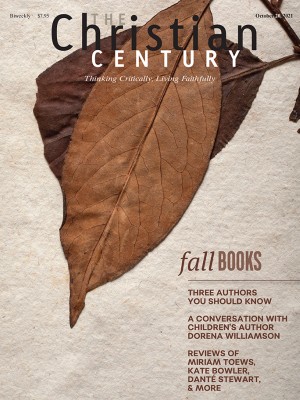October 31, Ordinary 31B (Ruth 1:1-18)
The story of two grieving and economically insecure women is the hinge of the entire covenant history.
I don’t get many such requests anymore, but when couples used to ask for Ruth’s famous vow in their wedding, I always suggested that the bride herself read it, while facing the groom’s mother. Emphasis on “where you die, I will die, and where you are buried, there I will be buried.” No takers so far.
Literalism flabbergasts poetry, and Ruth’s avowal is a powerful piece of poetry. Whenever we read it or hear it, if we know the attending story at all it directs our mind’s eye to follow Ruth and Naomi on their perilous journey back to Bethlehem, into the gleaning fields—and, for Ruth, straight to the foot of Boaz’s sleeping bag.
Read our latest issue or browse back issues.
Both prophetic and pastoral, there is so much to admire about this text and the reality-embracing women in the middle of it. Neither Naomi nor Ruth is confined or defined by her ethnicity. If Naomi has doubts about the beneficence of God, the eventual YHWH-faith of formerly pagan Ruth is rooted in her love for Naomi. And Naomi has a deep, self-denying love for her daughters-in-law. For their life and future’s sake, she is willing to go it alone to Bethlehem, though she most likely would not have survived the trip.
Then there is Naomi’s death-defying loyalty. The legal bonds between them have been sundered by their mutual loss, but they are galvanized by tragedy, bonded beyond religion and ethnicity, beyond time and circumstance.
There is a bit of comedy in the story, too. No one knows for sure what happens the night of the harvest festival. Boaz is the women’s protector before and after the party, and it may well be that Ruth’s advance, encouraged by Naomi, is not blush-worthy but based simply on their trust in his benevolence. Read it how you will, the morning-after rule-obeying of Boaz, coupled with Naomi and Ruth’s improvisations the previous night, are eventually responsible for the birth of Obed. Law and creativity seem ever woven into the will and work of God.
Still, I do find myself wanting to go with Orpah, at least for a little while, to see what happens when she returns to “her people and her gods.” Sometimes we judge her harshly for not being more like Ruth. Rabbinic literature opines that Orpah becomes the mother of Goliath and another three giants besides—one giant son for each of the (only?) four tears she cried at her parting from Naomi—and that one of David’s generals kills her with her own spindle.
Perhaps. All we can know is that Orpah sees and embraces the practical wisdom of her erstwhile mother-in-law’s bitter instructions. Naomi has lost all she ever had, including her faith—she has nothing to offer her widowed daughters-in-law. Orpah sees no reason to do anything other than turn back to her own land and people, sad as it makes her. The only thing the widows share anymore is memory and grief. For Ruth, that is enough. But Orpah sees a chance for something better than famine, struggle, and loneliness.
By any reasonable accounting, it is hard to deny that Naomi’s God has in fact turned the divine hand against her, her people, and their land—has provided nothing in the way of lasting blessing. For one example, from the very start, wherever there was food, the family of Elimelech was somewhere else. Then, when Mahlon and Chilion died—without further issue—the widows’ future looked as barren as the fields, with nothing to glean or share.
And so Orpah leaves Naomi, turns away from Naomi’s God and people, in search of something other than she has as yet experienced. I wonder if Orpah ever wondered about that moment, what she had gained and lost. We are left to wonder how the scriptures and traditions might have viewed her differently if she had stayed.
Then again, scripture is always showing us that different people can look at the same information and make different decisions, that a faith or faithfulness right for one may not be right for another, and that God’s will often depends on a calculus beyond the empirical. That prosperity is not always a sign of God’s favor, nor desperation a sign of God’s anger.
Back to Ruth and Naomi, the story of these two grieving and economically insecure women is the absolute hinge of the entire covenant history. As Eugene Peterson has noted, Ruth the Moabite refugee living in Bethlehem tethers all the big stories at the beginning of Bible to all the big stories at the end.
After Abraham and Sarah, Isaac and Rebecca, Jacob and Rachel, Joseph, Moses, Joshua, the judges, and Samuel—then comes the story of Naomi and Ruth.
On the other side of famine and displacement, death and loss, there come sweetness and joy again: for Ruth is the mother of Obed, the grandmother of Jesse, and the great-grandmother of David. We are right back in the middle of the big stories: Samuel (again), Saul and David, Nathan and Elijah, Isaiah and Jeremiah, stories that will take us north and south, far and wide, but ultimately full circle, back to Bethlehem where the many-times grandson of Ruth, himself a vagabond and refugee like his foremothers long before him, will be born, endure bitterness and loss, and die, in order to save the world outright.
The whole covenant relay depends on these world-weary women, and they do not drop the baton.






